Comprehensive Guide to Garden Maintenance in Poplar
Introduction to Garden Maintenance
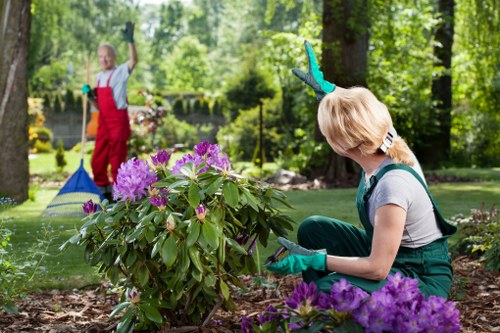
Maintaining a beautiful garden in Poplar requires a combination of knowledge, dedication, and the right tools. Whether you're a seasoned gardener or just starting out, understanding the nuances of garden upkeep in this specific locale can make all the difference. In this guide, we'll explore the essential aspects of garden maintenance tailored to Poplar's unique climate and soil conditions.
Poplar's climate, characterized by its mild winters and warm summers, allows for a diverse range of plants to thrive. However, this also means that gardeners must be vigilant about seasonal changes and specific care requirements to ensure their gardens remain vibrant year-round.
From soil preparation to pest control, we'll cover all the necessary steps to help you cultivate a lush and healthy garden. Let's dive into the fundamentals of garden maintenance in Poplar.
Understanding the Poplar Climate
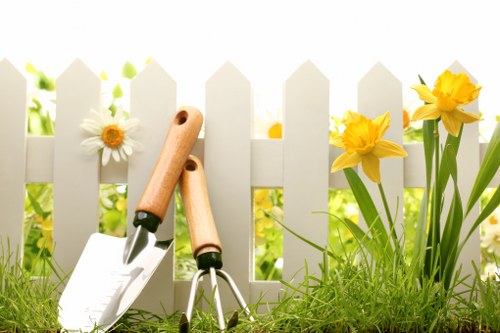
Poplar experiences a temperate climate, which plays a significant role in garden planning and maintenance. The region typically enjoys:
- Moderate rainfall throughout the year
- Distinct seasonal changes
- Ample sunlight exposure during the growing season
These conditions are ideal for a wide variety of plants, but it's crucial to choose species that are well-suited to the local environment. Understanding the climate helps in selecting plants that will not only survive but thrive, reducing the need for intensive maintenance.
Additionally, being aware of climate patterns allows gardeners to anticipate and prepare for potential challenges such as pests or extreme weather events. Proactive planning is key to successful garden maintenance in Poplar.
Soil Preparation and Health
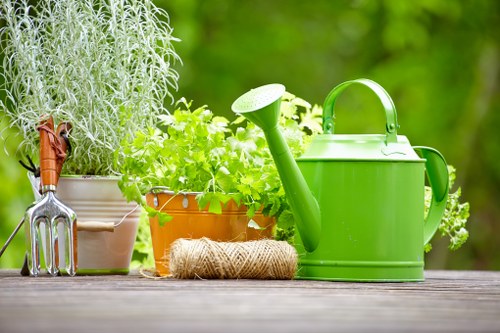
Healthy soil is the foundation of any successful garden. In Poplar, the soil composition can vary, so it's essential to conduct a soil test to determine its pH level and nutrient content. Based on the results, gardeners can amend the soil to improve its fertility and structure.
Common soil amendments include:
- Compost: Enhances soil texture and provides essential nutrients.
- Peat Moss: Improves water retention in sandy soils.
- Perlite: Increases aeration and drainage.
Regularly amending the soil ensures that plants have access to the necessary nutrients, promoting robust growth and resilience against diseases. Additionally, maintaining proper soil health reduces the reliance on chemical fertilizers, leading to a more sustainable gardening practice.
Seasonal Maintenance Tasks
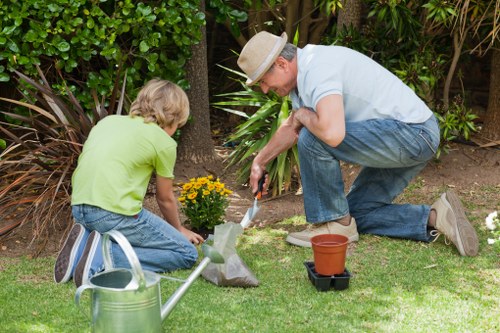
Effective garden maintenance in Poplar involves performing specific tasks throughout the year, tailored to each season's demands. Here's a breakdown of essential activities:
Spring
- Planting new perennials and annuals
- Pruning shrubs and trees
- Preparing garden beds by adding compost
Summer
- Regular watering and mulching
- Controlling pests and weeds
- Harvesting ripe vegetables and fruits
Autumn
- Clearing fallen leaves and debris
- Planting bulbs for next spring
- Protecting plants from early frosts
Winter
- Pruning dormant trees
- Planning garden layout for the upcoming year
- Maintaining tools and equipment
By adhering to a seasonal maintenance schedule, gardeners can ensure that their gardens remain healthy and productive throughout the year.
Essential Tools and Equipment
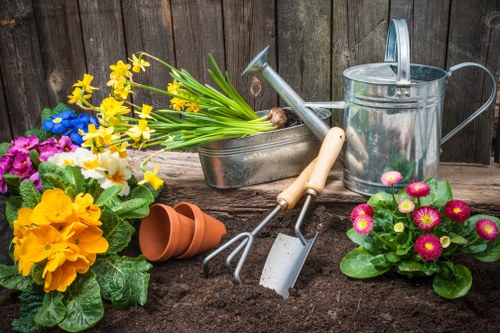
Having the right tools is crucial for efficient garden maintenance. Here are some must-have items for gardeners in Poplar:
- Pruning Shears: For trimming and shaping plants.
- Garden Fork: Ideal for turning soil and removing weeds.
- Watering Can or Hose: Ensures plants receive adequate moisture.
- Gloves: Protect your hands from thorns and dirt.
- Wheelbarrow: Useful for transporting soil, compost, and plants.
Investing in quality tools not only makes garden maintenance easier but also prolongs the life of your equipment. Regular maintenance of tools, such as cleaning and sharpening, ensures they remain effective and safe to use.
Additionally, consider eco-friendly gardening tools that reduce environmental impact, aligning your gardening practices with sustainability goals.
Pest and Disease Management

Pests and diseases can significantly impact garden health if not managed promptly. In Poplar, common garden pests include:
- Aphids
- Slugs and snails
- Whiteflies
Preventive measures are the first line of defense against these nuisances. Implementing practices such as crop rotation, encouraging beneficial insects, and maintaining plant health can reduce the likelihood of infestations.
If pests do become a problem, consider using organic treatments like neem oil or introducing natural predators to control their population. For diseases, ensure proper spacing between plants to promote airflow and reduce the risk of fungal growth.
Integrated Pest Management (IPM)
Adopting an Integrated Pest Management approach combines various strategies to manage pests effectively and sustainably. This includes monitoring pest levels, identifying specific threats, and applying appropriate control measures when necessary.
Pruning and Trimming Techniques

Pruning is vital for maintaining plant health, enhancing growth, and shaping gardens aesthetically. Different plants require specific pruning techniques:
- Deciduous Trees: Prune during the dormant season to promote healthy growth.
- Evergreen Shrubs: Trim lightly to maintain their shape without removing too much foliage.
- Flowering Plants: Remove spent blooms to encourage more blossoms.
Proper pruning not only improves the appearance of your garden but also helps prevent diseases by removing dead or diseased branches. It's essential to use sharp, clean tools to make precise cuts that facilitate quick healing.
Additionally, learning the correct pruning techniques for various plant species can significantly impact their growth and longevity.
Watering Strategies for Optimal Growth

Watering is a critical component of garden maintenance. Overwatering or underwatering can lead to plant stress and increased susceptibility to pests and diseases. In Poplar, consider the following strategies for effective watering:
- Early Morning Irrigation: Reduces evaporation losses and allows plants to hydrate before the heat of the day.
- Drip Irrigation Systems: Provide targeted moisture to plant roots, conserving water and promoting deep root growth.
- Mulching: Helps retain soil moisture and regulate temperature.
It's essential to adjust watering schedules based on seasonal changes and rainfall patterns. Using a rain gauge or soil moisture sensors can help determine when and how much to water your plants.
Additionally, grouping plants with similar water needs together can streamline irrigation practices and ensure that each plant receives appropriate hydration.
Mulching for Soil Health

Mulching is an effective practice that offers multiple benefits for garden maintenance:
- Moisture Retention: Reduces the frequency of watering by keeping the soil moist.
- Weed Suppression: Minimizes weed growth by blocking sunlight.
- Soil Temperature Regulation: Keeps the soil cooler in summer and insulated during colder months.
Organic mulches, such as bark, straw, and compost, also contribute to soil health by breaking down and enriching the soil with nutrients. Applying a layer of mulch around plants helps maintain a stable environment, promoting healthy growth.
Ensure that mulch is applied to an appropriate depth, typically 2-3 inches, and kept away from the stems of plants to prevent rot and other issues.
Weed Control Methods

Weeds compete with your garden plants for nutrients, water, and sunlight, making effective weed control essential. Here are some strategies to manage weeds in Poplar gardens:
- Hand Weeding: Manual removal of weeds is labor-intensive but effective for small gardens.
- Mulching: As mentioned earlier, mulching helps suppress weed growth.
- Herbicides: Use chemical or organic herbicides judiciously to eliminate stubborn weeds.
Preventive measures, such as maintaining a healthy garden and promptly removing weeds when they appear, are crucial for long-term weed management. Additionally, selecting ground covers that outcompete weeds can reduce the need for constant weed control.
Regularly inspecting your garden and addressing weed issues early can save time and effort in maintaining a pristine garden environment.
Fertilizing for Plant Nutrition

Fertilizing provides essential nutrients that plants need to grow and thrive. In Poplar, it's important to choose the right type of fertilizer based on your soil test results and the specific needs of your plants.
- Organic Fertilizers: Such as compost, manure, and bone meal, improve soil structure and provide slow-release nutrients.
- Synthetic Fertilizers: Offer immediate nutrient availability but should be used cautiously to avoid over-fertilization.
- Liquid Fertilizers: Ideal for foliar feeding and providing quick nutrient boosts.
Apply fertilizers during the growing season when plants are actively absorbing nutrients. Avoid fertilizing during dormant periods to prevent burning the plants and disrupting their natural cycles.
Regular monitoring of plant health will help determine the appropriate fertilization schedule and prevent nutrient deficiencies or excesses.
Pruning and Shaping for Aesthetics

Beyond promoting plant health, pruning plays a significant role in shaping your garden's aesthetic appeal. Proper pruning techniques can enhance the natural beauty of your plants and create visually appealing garden structures.
- Topiary: Shaping plants into ornamental forms.
- Espalier: Training trees to grow flat against a structure.
- Deadheading: Removing spent flowers to encourage new blooms.
By thoughtfully pruning and shaping your plants, you can create a harmonious and well-organized garden layout. This not only improves the overall appearance but also facilitates better air circulation and light penetration, contributing to healthier plant growth.
Experiment with different pruning styles to find what best suits your garden's design and your personal preferences.
Lawn Care and Maintenance

A well-maintained lawn serves as the centerpiece of many gardens in Poplar. Proper lawn care involves several key practices:
- Mowing: Regular mowing at the correct height promotes healthy grass growth.
- Aeration: Relieves soil compaction and enhances root development.
- Overseeding: Introduces new grass varieties to maintain density and color.
Additionally, addressing common lawn issues such as weeds, pests, and diseases promptly ensures a lush and resilient lawn. Using appropriate fertilizers and maintaining proper irrigation practices are also essential for optimal lawn health.
Consider integrating native grass species that are well-suited to Poplar's climate, reducing the need for extensive maintenance and promoting biodiversity.
Landscape Design and Planning

Effective garden maintenance begins with thoughtful landscape design and planning. A well-designed garden not only looks appealing but also facilitates easier maintenance.
- Zoning: Divide your garden into zones based on plant types and maintenance needs.
- Irrigation Layout: Plan efficient watering systems to ensure all plants receive adequate moisture.
- Pathways and Access: Design clear pathways for easy navigation and maintenance tasks.
Incorporating elements such as raised beds, container gardens, and vertical planting can enhance both the functionality and beauty of your garden. Additionally, selecting plants with complementary growth patterns and colors creates a cohesive and harmonious landscape.
Regularly reviewing and adjusting your garden design allows you to adapt to changing conditions and evolving preferences, ensuring long-term satisfaction with your garden space.
Sustainable Gardening Practices

Embracing sustainable gardening practices not only benefits the environment but also leads to a healthier and more resilient garden. Key sustainable practices include:
- Composting: Recycles organic waste into nutrient-rich soil amendments.
- Rainwater Harvesting: Collects and stores rainwater for irrigation purposes.
- Native Plant Selection: Utilizes plants that are adapted to the local climate, reducing the need for excessive watering and maintenance.
Implementing these practices helps conserve resources, reduce waste, and support local ecosystems. Additionally, sustainable gardening often results in lower maintenance requirements and healthier plants.
By prioritizing sustainability, gardeners in Poplar can create beautiful gardens that thrive while minimizing their environmental footprint.
Hiring Professional Garden Maintenance Services

While DIY garden maintenance is rewarding, there are instances where hiring professional services can be beneficial. Professionals bring expertise, experience, and specialized equipment that can enhance your garden's health and appearance.
- Expertise: Professionals understand the intricacies of plant care, pest management, and landscape design.
- Time-Saving: Outsourcing maintenance tasks frees up your time for other activities.
- Quality Results: Experienced gardeners can achieve results that might be challenging to attain on your own.
When selecting a garden maintenance service in Poplar, consider factors such as reputation, range of services offered, and pricing. Reading reviews and seeking recommendations can help you find a reliable and skilled service provider.
Investing in professional maintenance can lead to a more vibrant and well-maintained garden, providing you with peace of mind and a beautiful outdoor space to enjoy.
DIY Garden Maintenance Tips

For those who prefer a hands-on approach, here are some DIY tips to maintain your garden in Poplar:
- Regular Inspection: Check plants regularly for signs of pests or diseases.
- Proper Tool Care: Keep your gardening tools clean and well-maintained.
- Efficient Watering: Water deeply and less frequently to encourage deep root growth.
Additionally, educating yourself about the specific needs of your plants and staying updated on gardening best practices can significantly improve your maintenance efforts. Joining local gardening groups or attending workshops in Poplar can provide valuable insights and support.
Embracing a proactive and informed approach to garden maintenance ensures that your garden remains a source of pride and joy.
Conclusion and Next Steps

Maintaining a garden in Poplar is a rewarding endeavor that combines creativity, knowledge, and dedication. By understanding the local climate, preparing the soil, implementing seasonal maintenance tasks, and utilizing the right tools and techniques, you can cultivate a thriving and beautiful garden.
Whether you choose to handle maintenance yourself or enlist professional services, the key is to stay informed and proactive in your gardening practices. Embracing sustainable methods and continuous learning will ensure that your garden remains vibrant and resilient for years to come.
Ready to transform your garden? Contact us today to learn more about our garden maintenance services in Poplar and take the first step towards a lush and healthy outdoor space.